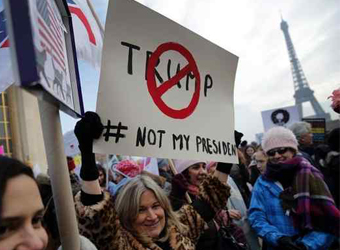Millions of protesters have taken to the streets of cities in the US and around the globe to rally against the new US President Donald Trump.
Larger numbers of demonstrators than expected turned out for more than 600 rallies worldwide.
The aim was principally to highlight women’s rights, which activists believe to be under threat from the new administration.
Meanwhile, Mr Trump used his first full day in office to visit the CIA’s HQ.
He said he was “1,000%” behind the spy agency’s employees and also accused the media of being dishonest in its reporting of the size of the crowd at his inauguration.
Mr Trump did not refer to Saturday’s protests.
The biggest US rally was in the capital Washington, which city officials estimated to be more than 500,000-strong.
This far exceeded the 200,000 that had originally been expected by organisers of the Women’s March on Washington.
By most estimates, it also surpassed the crowd at Friday’s presidential inauguration.
The protesters in the nation’s capital heard speeches from Scarlett Johansson, Ugly Betty star America Ferrera, Ashley Judd, Gloria Steinem and Michael Moore among others.
A planned march to the White House proved impossible as the entire route was filled with demonstrators.
Interim DC Police Chief Peter Newsham told Associated Press: “The crowd stretches so far that
During his speech, Michael Moore ripped up a copy of the Washington Post, saying: “The headline was ‘Trump takes power’. I don’t think so. Here’s the power. Here’s the majority of America right here. We are the majority.”
The singer Madonna also made an appearance, swearing several times in a speech carried live by major US TV networks.
“Yes, I am outraged. Yes, I have thought an awful lot about blowing up the White House,” she said.
America Ferrera told the crowd: “We march today for the moral core of this nation, against which our new president is waging a war.”
Huge crowds were reported at other US protests.
So many turned out in Chicago – some 150,000 – that a planned march had to be called off and the event declared a rally. Streets were also overflowing in Los Angeles.
Huge crowds were also reported in New York, Seattle, Boston and Miami, some of the venues for about 300 nationwide protests.
Many women wore knitted pink “pussy hats” – a reference to a recording that emerged during the election campaign in which Mr Trump talked about groping women.
Organisers of a London rally said between 80,000 and 100,000 people had taken part there. Belfast, Cardiff, Edinburgh, Leeds, Liverpool, Manchester and Bristol were among the other UK cities holding protests.
Anti-Trump marches took place earlier in Australia, New Zealand and in several Asian cities.
Several thousand women and men joined a rally in central Sydney, with a similar number in Melbourne.
Women’s March Sydney co-founder Mindy Freiband told the crowd: “Hatred, hate speech, bigotry, discrimination, prejudicial policies – these are not American problems, these are global problems.”
Barcelona, Rome, Amsterdam, Geneva, Budapest, Prague and Berlin were among the European cities that took part.
In Paris, protester Francoise Seme Wallon said Mr Trump was “a nasty guy and he’s dangerous for the whole world”.
Mr Trump’s first full day in office began with an inter-faith service at Washington National Cathedral.
He then visited the CIA’s HQ in Langley, Virginia.
In a speech there, he told about 400 employees: “There is nobody who feels stronger about the intelligence community and the CIA than me.”
During the election campaign, Mr Trump had sharply criticised the intelligence agencies over their stance on alleged Russian involvement.
Mr Trump also talked up his yet-to-be-confirmed nominee for CIA chief, Mike Pompeo.
“You will be getting a total gem,” he told the employees.
In one of his first steps, Mr Trump ordered government agencies to ease the “economic burden” of the health law known as Obamacare.
His team also quickly overhauled the White House website. The revamp replaces Barack Obama’s policies with Mr Trump’s new agenda.
The new administration lists only six issues on the websit , energy, foreign policy, jobs, and growth, military, law enforcement and trade deals.
Critics complained that it made no mention of civil rights, healthcare, climate change or LGBT rights.
Source: BBC


